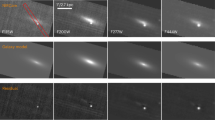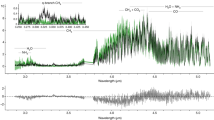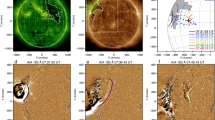Abstract
ON the assumption that the red-shifts observed in the spectra of the extra-galactic nebulæ are due to a Doppler effect, Hubble's observations indicate that the nebulæ are receding from us with velocities proportional to their distance from us. Thus at each point in space there exists a characteristic velocity and a preferred time-axis in four-dimensional spacetime, this preferred time-axis being that with respect to which the matter at the point is at rest.
This is a preview of subscription content, access via your institution
Access options
Subscribe to this journal
Receive 51 print issues and online access
$199.00 per year
only $3.90 per issue
Buy this article
- Purchase on Springer Link
- Instant access to full article PDF
Prices may be subject to local taxes which are calculated during checkout
Similar content being viewed by others
References
Milne, Proc. Roy. Soc., A, 158, 324 (1937) and earlier papers.
Dirac, Proc. Roy. Soc., A, 165, 199 (1938).
Dirac, NATURE, 139, 323 (1937).
Eddington, "Relativity Theory of Protons and Electrons", p. 272.
Author information
Authors and Affiliations
Rights and permissions
About this article
Cite this article
ARNOT, F. Cosmological Theory. Nature 141, 1142–1143 (1938). https://doi.org/10.1038/1411142a0
Issue Date:
DOI: https://doi.org/10.1038/1411142a0
Comments
By submitting a comment you agree to abide by our Terms and Community Guidelines. If you find something abusive or that does not comply with our terms or guidelines please flag it as inappropriate.



